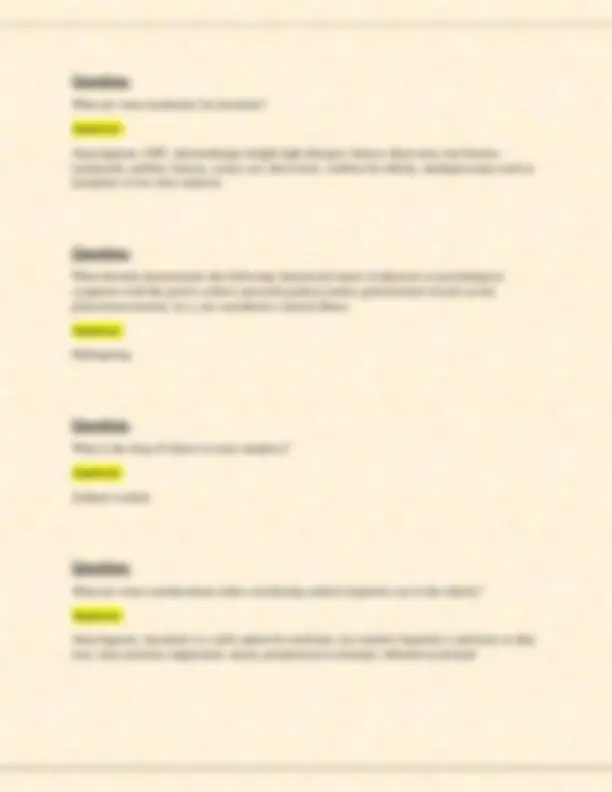

























Study with the several resources on Docsity

Earn points by helping other students or get them with a premium plan


Prepare for your exams
Study with the several resources on Docsity

Earn points to download
Earn points by helping other students or get them with a premium plan
Community
Ask the community for help and clear up your study doubts
Discover the best universities in your country according to Docsity users
Free resources
Download our free guides on studying techniques, anxiety management strategies, and thesis advice from Docsity tutors
NSG552 / NSG 552 Exam 2 (Latest 2025 / 2026): Psychopharmacology | Grade A | Questions and Answers (Verified Elaborations) 100% Correct – Wilkes
Typology: Exams
1 / 31

This page cannot be seen from the preview
Don't miss anything!
























Occurs when a person develops emotional or behavioral symptoms in response to a stressful event or situation; symptoms aren't those of normal bereavement and resolve within 6 months of the stressor
Adjustment disorders
Which of the following class of meds are used as first-line therapy for PTSD?
SSRIs (sertraline and duloxetine)
What do you need to monitor if a patient is on Prazosin?
Blood pressure
Why are benzodiazepines contraindicated in PTSD treatment?
They interfere with the psychological processes needed to benefit from CBT: there is a high rate of comorbid SUD w/PTSD and benzodiazepines are highly addictive
What medications are FDA approved to treat PTSD?
Sertraline and Paroxetine
When would you augment treatment of PTSD with an atypical antipsychotic?
Only in SEVERE cases
What co-occurring disorder do patients with DID typically have?
What are the suggested treatments for excoriation disorder?
Psychotherapy; SSRIs to treat concurrent anxiety/depression; antipsychotics; ansiolytics
What disorder has the following characteristics: recurrent skin picking that results in lesions despite attempts to stop?
excoriation disorder
What is the suggested treatment for tricholillomania?
Psychotherapy; SSRIs for concurrent anxiety/depression; Clomipramine, Atypical antipsychotics (lithium, N-acetylcyteine
What disorder has the characteristic of recurrent pulling out one's hair despite repeated attempts to stop?
Trichotillomania
What is the suggested treatment for hoarding disorder?
CBT specific for hoarding; SSRIs to treat concurrent anxiety/depression
What disorder has the following characteristics: persistant difficulty discarding possessions regardless of value resulting in accumulation of possessions that compromise living space/ability to function. Person is resistant to treatment
Hoarding disorder
What is the suggested treatment for body dysmorphic disorder?
Psychotherapy, SSRIs for concurrent anxiety/depression/OCD
What disorder has the following characteristics? Preoccupation with one or more perceived defects or flaws in physical appearance; spends significant time trying to correct perceived flaws w/makeup, dermatological procedures, or plastic surgery
Body dysmorphia disorder
Are there any medications effective in treating dissociative amnesia?
No
What is a sudden unexpected travel away from home accompanied by amnesia for identity or other autobiographical information?
Dissociative fugue
In what disorder is the person unable to remember important personal information, history of traumatic in nature, inconsistent w/ordinary forgetfulness?
Dissociative amnesia
What are some predisposing factors to depersonalization and derealization?
Trauma and severe stress
What is unreality or detachment from ones surroundings
derealization
What is a feeling of unreality or detachment from one's body, thoughts, feeling, or actions?
Depersonalization
What is a lapse in autobigraphical memory?
Amnesia
What is a defense mechanism that protects a person from overwhelming anxiety by emotionally separating A disruption in the integrated sense of self?
Dissociation
What part of the brain is implicated in PTSD that is responsible for memory and learning?
Hippocampus
What disorder presents as; binge-eating w/behaviors to counteract weight gain (vomit, laxatives, diuretics, etc), embarrassed by binge eating, overly concerned about body weight, usually maintains normal body weight or may be overweight
Bulimia nervosa
With OTC sedatives/hypnotics- does a tolerance to sedating effects develop rapidly?
Yes
Which phase of sleep is eszopiclone (lunesta) used?
Both- onset and maintenance
What is nonrestorative sleep?
Waking up feeling fatigued and unrefreshed
What is the MOA of Rameltzon (remeron)
M1 and M2 agonist (selective melatonin)
What are non-pharmacologic treatments for sleep apnea?
weight loss, avoidance of ETOH, CPAP, uvulopalatopharyngoplasty
What are some side effects of Zolpidem (Ambien)?
antegrade amnesia, hallucinations, parasomnias (sleep walking and eating), increased fall risk, GI effects
What are treatments for RLS?
Remove offending agent, iron replacement; 1st line= dopamine agonists (pramipexole and ropinirole); Gabapentin/pregabalin, benzos
What is the MOA of zolpidem?
Selectively binds to Omega=1 receptor on GABA-A receptor (responsible for sedation)
early morning awakening
What happens during middle/sleep maintenance insomnia?
Frequent nocturnal awakenings
What is an example of an activating serotonergic agent?
Venlafaxine
In waht disorder do people present with one physical symptom that is present >6 months, believe they are ill, and do not intentionally produce symptoms?
Somatic Symptom Disorder
What is the treatment of anorexia?
SSRIs for concurrent depression, alprazolam, and olanzipine, CBT
What disorder presents with the following: preoccupation w/weight, body image, being thin; 2 types (restricting and binging/purging), intense fear of gaining weight/being fat, restrict calories, low body weight
anorexia nervosa
What medication is contraindicated in eating disorders and why?
Bupropion bc it lowers seizure thresholds
What are some ways to manage narcolepsy?
sleep hygiene, daytime naps, no shift work, Modanfinil= 1st line
What class of medications can help reduce obsessions and severe fearful preoccupations associated with psychosomatic disorders?
SSRIs
Priaprism is commonly associated with which antidepressant commonly used for sleep?
Trazadone
What are recommended treatments for factitious disorder?
Collaboration w/PCP, confrontation in a non-threatening manner
What antidepressants may be used for sedating properties?
Amitriptyline, doxepin, mirtazapine, trazadone
What disorder presents with the following: Falsifying physical and/or psychological signs and symptoms to assume a sick role, absence of external reward, repeated and long hospitalizaitons?
Factitious disorder
Why should flurazepam be avoided in the elderly?
long half life/ may cause excessive drowsiness
What are recommended treatments for illness anxiety disorder
SSRIs to treat depression/anxiety, regular visits with PCP, CBT
What are recommended treatments for conversion disorder?
Education about illness; CBT
What are recommended treatments for somatic symptom disorder
regular visits with PCP/ slowly address psychological issues
What disorder? Preoccupation with having/getting serious illness, somatic symptoms or mild symptoms, persists>/= 6 months, performs excessive health related behaviors?
Illness anxiety disorder
Benzodiazepines
Is buspirone (Buspar) a high or low risk for abuse/addiction?
low risk
What are some common non-benzo anxiolytics?
buspirone, hydroxyzine, barbituates, propanolol
If a patient is experiencing SSRI sexual dysfunction what medication is a good alternative?
Buspirone
What are some key things to consider regarding hydroxyzine?
wide dosage range b/c it affects people differently, can be sedating, may cause weight gain, may have a paradoxical response, best for patients who are benzo naive
What is diazepam most often prescribed for?
GAD, severe ETOH withdrawal, seizures
What are the risks of benzo use for the elderly?
Increased fall risk, Increased risk of hip fracture
What is the first-line treatment of chronic anxiety, GAD, and panic disorder and why?
SSRIs- treat comorbid depression, lack abuse risk, low risk of side effects
What medical conditions can precipitate anxiety?
COPD, DM, thyroid disease, Seizures
What is the mechanism of action of buspirone?